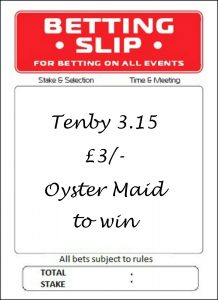 Quite why Nottingham should have instigated a new fixture on 8 September 1973 with an Oyster Maid Selling Stakes is a mystery, as the Welsh-trained horse of that name had no obvious connection with the East Midlands.
Quite why Nottingham should have instigated a new fixture on 8 September 1973 with an Oyster Maid Selling Stakes is a mystery, as the Welsh-trained horse of that name had no obvious connection with the East Midlands.
Oyster Maid landed a huge betting coup in a selling hurdle at Tenby in 1927. She was one of trainer David Harrison’s three runners in an eight-horse race in which most of the participants were allegedly aware of the plan and stood to profit by it. It was even thought the SP reporter was in on it as well, and instead of returning the mare at 8/1 he doubled it to 100/6.
Numerous accounts had been carefully set up with bookmakers’ offices up and down the country, and they were each hit with telegrams just before the race staking large sums on Oyster Maid. The nearest phone to the course was 300 yards away, and a convenient snowstorm made tic-tac communication impossible. A motorcyclist rushed down to the track to alert the bookies but he was so agitated the policeman at the gates would not let him in! Many bookmakers, unable to pay, scarpered. Others refused to pay. The offices could not avoid their liabilities.
Some say the coup was organised to help fund one or two Welsh jockeys, but whether or not that was true, life-changing amounts were won by the plotters. One estimate put it at £880,000, which would be over £45 million in today’s money. Bookies were hit so hard that in future few were inclined to trade at Tenby or take meaningful bets about runners there. Other owners and trainers wary of further shady business stayed away, and the course closed in 1936.
Nottingham’s Oyster Maid seller attracted no such controversy and was last run on 7 September 1987.
Sources include:
The Rise and Fall of Tenby Races, by Richard Lawrence
Racing Rogues, by Brian Lee